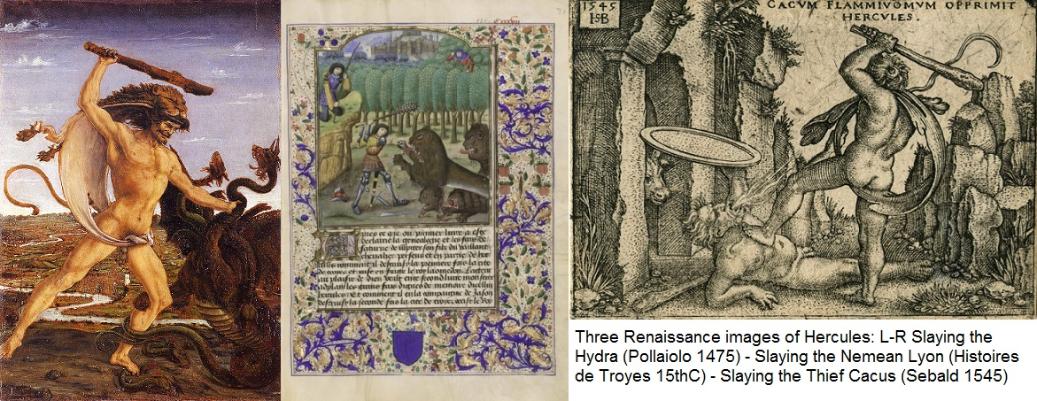HENRY, HERCULES & THE PRINCES IN THE TOWER - THE EPIC POETRY OF BERNARD ANDREAS
Throughout history monarchs have patronised men of letters but the Tudor kings Henry VII and Henry VIII were unusual in appointing Bernard Andreas as their poet laureate because this scholarly monk spoke no English, wrote only in Latin or French and was totally blind!
Andreas was born c.1450, in the French city of Toulouse, and like many sons of medieval aristocrats he was destined for a career in the church. After being ordained as an Augustinian friar, Andreas became a doctor of law and sometime in the early 1480s he was introduced to the exiled Henry Tudor. He must’ve made a good impression because shortly after Henry’s victory at Bosworth, Andreas was invited to England, given a handsome pension and appointed the official poet and chronicler to the new Tudor court.
Henry knew the value of propaganda and Andreas first work, written in Latin, celebrated the Tudor king’s triumphal entry into London. Subsequent poems marked Henry’s marriage to Elizabeth of York and the birth of Prince Arthur, to whom he was appointed tutor in 1496, and this began the custom of commemorating royal milestones in verse that continues to this day. Andreas also wrote love poetry and commentaries on classical texts but his most important work is his ‘Life of Henry VII’.
Even though Andreas is more interested in literary flourishes than historical fact, and he frequently apologises for his blindness which prevented him from recording events in greater detail, his biography of his employer is priceless because it’s our only contemporary source for many episodes in Henry VII’s reign. The mainly Latin manuscript also includes an extraordinary epic poem, originally written in Andreas’ native French, in which he compares Henry’s fight for the throne with The Twelve Labours of Hercules.
‘Les Douze Triomphes de Henri VII’ begins with the tale of the Nemean Lion, whose impenetrable skin the Greek hero wore as armour in his later tasks, and Andreas compares this ferocious feline to Richard III. He also gives us the gruesome image of Richard being skinned:
“King Henry, being beyond the sea,
Expected to be devoured by him;
But God provided for him so well
That he has conquered him and dressed himself in his hide.
Of this hide it will be shown to you
That it should be understood to mean virtue
The hide is strength and prudence and wealth…”
Andreas goes on to equate the many headed Hydra dispatched by Hercules to the rebellious nobles of Plantagenet England and Richard III is again pilloried in the tale of the Erymanthian boar. This is something of a gift for the satirist as the last Yorkist king’s heraldic badge was a wild boar:
“This wild boar it is right that I should set down
For king Richard, as he comes into this place,
Who held, like a false and unjust one,
The royal place, without a right to it.
Now he had taken for his device
The great hog, which is a very foul animal
And I know not why he took it,
Unless it be God who prompts the heart.
Honour [belongs] to the good man, and the wicked acquires
Every disgrace; nobility renounces him.
For crime offends, and is called dishonourable.
He is a mean fellow who does mean actions…”
Andreas also gives us his opinion on that most enduring of medieval mysteries the fate of the Princes in the Tower:
“Moreover I would speak of this Richard,
How he was of such blunted feelings
As to destroy his own nephews.
This was too great a cruelty in him…”
And so it goes on. All Henry’s enemies, both foreign and domestic, are represented as the villains and monsters vanquished by Hercules so the Yorkist matriarch Margaret of Burgundy becomes the Amazon Queen Hippolyta, whose girdle was stolen by the demi-god, whilst Martin Schwartz, the Yorkist mercenary who Margaret employed to revive the White Rose (see previous post) is the bloodthirsty King Diomedes who fed unwary travellers to his flesh eating horses.
Similarly the King of Scotland is represented as the gargantuan bull that devastated Crete, the pretender Perkin Warbeck appears as the cattle thief Cacus (from the Roman version of the legend) and the hellish Stymphalian birds, who hurled their poisonous dung and bronze feathers at their enemies, are the robbers and pirates that Henry drove out of England.
As a Frenchman, Andreas had a deep loathing for the German Hapsburgs and he reserves his choicest vitriol for the Holy Roman Emperor Maximilian who appears in two of Henry’s twelve triumphs. Firstly Maximilian is depicted as one head of the three headed ogre Geryon (the others being his brother and the aforementioned Margaret of Burgundy) and secondly as the dragon Ladon that guarded the Hesperides’ golden apples. Andreas accuses Maximilian of trying to destroy the peace between England and France and thanks God that Henry thwarted the emperor’s dastardly scheme:
“Then has this king [Henry] acquired the fair treasure
Which he gathered in the pleasure garden,
That is to say, the said golden apples,
I mean by them the fleurs-de-lis of France,
The happy alliance with the French king;
May God be willing to keep them in friendship.
Whoever would wish any hurt to the two kings,
May evil shortly befall him…”
Compared to Chaucer or Shakespeare, Andreas’ poetry has little literary merit but his classical scholarship was praised by such luminaries as Thomas More and Erasmus. When Henry VII died, Andreas continued as court poet to his son and some believed it was Andreas who penned Henry VIII’s famous diatribe against Luther (see previous post). Sadly much of what Andreas wrote has been lost but an English translation of his ‘Life of Henry VII’, including The Twelve Labours, is available online - click here
